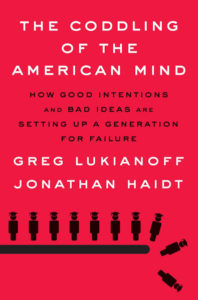
A few months ago I encouraged him to read Ross Douthat’s Bad Religion. A couple of weeks later he texts me: “About halfway through Bad Religion. Wow! Very depressing! Are there any uplifting trends ahead?” I reluctantly said “yes,” but in my mind I said “wait until I recommend Haidt’s The Coddling of the American Mind.” I don’t share Douthat’s pessimism,1 although I’m convinced he is more optimistic than he’s letting on. Haidt, however takes it to the next level — the level that unfolds when bad ideas are acted upon. It is interesting to note the year Douthat’s book got published. It was in 2013, the same year Haidt started observing a cultural shift in attitudes and behaviors among college freshmen. It’s as if both authors decided to run a cultural marathon; Douthat running the first leg and then passed the jeremiad baton to Haidt to finish it.
I found myself writing unusually copious notes on this reading. There is a lot of material here to unpack and as much as I’d like to devote the time and space to write, it simply is not doable for the purposes of this blog. It will be a challenge and I risk committing an injustice by not covering nearly enough of the important issues the authors raise in the book. Be that as it may, I wish to point out one specific problem the iGen must address if they expect a path toward human flourishing.
Haidt and Lukianoff keenly observed that a significant change took place in the personalities of youth entering college in 2013 that weren’t present a year prior. This marked change manifested in a myriad of ways, resulting in a dramatic rise in depression, high levels of anxiety, feelings of unsafeness (Safetyism), and a host of other similar behavior challenges arising within a very short period of time beginning in the early 2010s. Moreover, these “terrible ideas”2 have contributed to the hostility we now observe as a common occurrence in the U.S. colleges and universities.
Protest, demands and violence are all ways to enact change in the minds of college students these days. According to Georgetown University linguistics professor Deborah Tannen, we are living in an “argument culture”3 or a “call-out culture,”4 in which students gloatingly expose exaggerated offenses from individuals or groups outside their circle of influence. College is a time when young adults learn new ideas, develop a worldview around which to base their lives. Even if new ideas clash with existing ones, a mature adult learns to tolerate them. What has happened to our youth?
One of the causes can be attributed to the loss of meaning in words. The authors were not explicit in this but one can surmise just judging by the numerous examples all throughout the book. For example, asking for peaceful dialog is considered violent5; “hate speech” is anything that is interpreted as having a negative impact by the receiver regardless of intent6; “safety” now includes “emotional safety,7” and so on. Words no longer have meaning or its meaning can be changed at will.
Confucius (c. 500 BC) lived through periods of political unrest. When he was asked how society can be restored he said that words need to be accorded its proper meaning. He said “If language be not in accordance with the truth of things, affairs cannot be carried on to success”8 This sounds very much like the correspondence theory of truth9 which states that a proposition is true just in case it corresponds to reality, when what it asserts to be the case is the case.
It would seem preposterous to say we can fix this complex problem quickly. However, it would be equally irresponsible not to offer a way forward when we understand what ails our young people. Scripture can be a valuable source of help here. Our help comes in the person of Jesus, the Word (logic) made flesh, Immanuel, God with us. It is rather timely that this idea of Jesus being the living Word of God, turns out to be the savior who restores the broken link between word and meaning. James Hunter is emphatic as he offers a solution in his concept of Faithful Presence Within:
It can be summarized in two essential lessons for our time. The first is that incarnation
is the only adequate reply to the challenges of dissolution; the erosion of trust between word and world and the problems that attend it. From this follows the second: it is the way the Word became incarnate in Jesus Christ and the purposes to which the incarnation was directed that are the only adequate reply to challenge of difference.10
As Christian leaders we must introduce the young generation to the one who unites word and world, and has come to show us the way, truth and the life.
- Ross Gregory Douthat, Bad Religion: How We Became a Nation of Heretics (New York: Free Press, 2013), 278.
- Greg Lukianoff and Jonathan Haidt, The Coddling of the American Mind: How Good Intentions and Bad Ideas Are Setting up a Generation for Failure (New York: Penguin Press, 2018).1.
- Deborah Tannen, The Argument Culture: Moving from Debate to Dialogue (New York: Ballantine Books, 1998), 3.
- Lukianoff and Haidt., 71
- Ibid., 84.
- Ibid., 85
- Ibid., 24
- Confucius, The Analects – 13, US, December 13, 1901, , accessed May 17, 2019, https://china.usc.edu/confucius-analects-13.
- Marian David, The Correspondence Theory of Truth, Stanford Encyclopedia of Philosophy, May 28, 2015, , accessed May 17, 2019, https://plato.stanford.edu/entries/truth-correspondence/.
- James Davison. Hunter, To Change the World: The Irony, Tragedy, and Possibility of Christianity Today (New York: Oxford University Press, 2010), 241.






